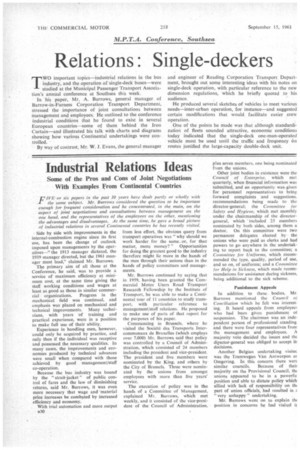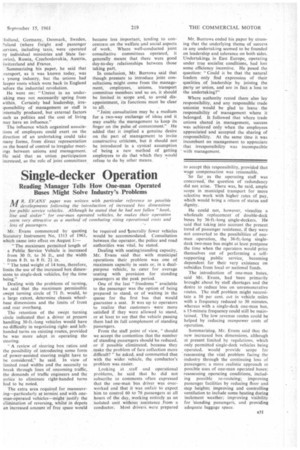Industrial Relations Ideas
Page 64

Page 65

If you've noticed an error in this article please click here to report it so we can fix it.
Some of the Pros and Cons of Joint Negotiations With Examples Vrom Continental Countries
ivE. or six papers in the past 10 years have dealt partly or Wholly with the same subject. Mr. Burrows considered the question to be. important enough for frequent consideration and he concentrated, in the main, on the aspect of joint negotiations and consultations between management on the one hand, and the representatives of the employees on the other, mentioning the advantages and disadvantages. At the same time, he gave a broad picture of industrial relations in several Continental countries he has recently visited.
Side by side with improvements in the internal-combustion engine since its first use, has been the change of outlook imposed upon managements by the operatives—" the 1913 manager dictated, the 1939 manager directed, but the 1961 manager must lead," claimed Mr. Burrows.
The primary aim of all those at the Conference, he said, was to provide a service of maximum efficiency at minimum cost, at the same time giving the staff working conditions and wages at least as good as those in similar commercial organizations. Progress in the mechanical field was continual, and emphasis was placed on mechanical and technical improvements. Many technicians, with years of training and practical experience, were in a position to make full use of their ability.
Experience in handling men, however, could only be acquired by practice, and only then if the individual was receptive and possessed the necessary qualities. In many cases, the improvements and economies produced by technical advances were small when compared with those achieved by good management/staff co-operation.
Because the bus industry was bound by the " strait-jacket " of public control of fares and the law of diminishing returns, said Mr. Burrows, it was even more necessary that wage and material price increases be combated by increased efficiency and economy.
With trial automation and more output n30 from less effort, the obvious query from transport operatives was "why should we work harder for the same, or, for that matter, more money? " Opportunities for doing the greatest good to the industry therefore might lie more in the hands of the men through their unions than in the hands of policy committees and managements.
Mr. Burrows continued by saying that in 1959, having been granted the Commercial Motor Users Road Transport Research Fellowship by the Institute of Transport, he was able to make a Continental tour of II countries to studY transport, with particular reference to management/staff relations. He proposed to make use of parts of that report for the purposes of his paper.
Commencing in Brussels, where he visited the Societa des Transports Intercommunaux de Bruxelles (which employs over 7.000) Mr. Burrows said that policy was controlled by a Council of Administration, which consisted of 24 members including the president and vice-president. The president and five members were nominated by the King, and others by the City of Brussels. Three were nominated by the unions from amongst employees with more than five years' service.
The execution of policy was in the hands of a Committee of Management, explained Mr. Burrows, which met weekly, and it consisted of the vice-president of the Council of Administration, plus seven members, one being nominated from the unions.
Other joint bodies in existence were the Council of Enterprise, which met quarterly, when financial information was submitted, and an opportunity was. given for personnel representatives to bring forward complaints and suggestions. recommendations being made to the director-general; the Committee for Safety and Hygiene, which met monthly under the chairmanship of the directorgeneral, which • included 25 members nominated by both sides, among them a doctor. On this committee were two permanent delegates elected by the unions who were paid as clerks and had powers to go anywhere in the undertaking to report back to the committee; a Committee for Uniforms, which recommended the type, quality, period of use, and so on, of uniforms; and a Committee for Help in Sickness, which made recommendations for assistance during sickness, being additional to the sick scheme.
Punishment Appeals
In addition to these bodies, Mr. Burrows mentioned the Council oj Conciliation which he felt was interest. ing. It heard appeals from employee; who had been given punishment ol suspension. The chairman was an independent person of professional standing and there were four representatives from the management and employees. A majority vote decided the issues and th( director-general was obliged to accept in decisions.
Another Belgian undertaking visite( was the Tramwegan Van Antwerpen er Omgeving. In this concern there wer( similar councils. Because of theil majority on the Provisional Council, tin unions appeared to be in a powerfu position and able to dictate policy which allied with lack of responsibility on du part of union officials, had resulted in 1. "very unhappy" undertaking.
Mr. Burrows went on to explain tilt position in concerns he had visited it
4oliand, Germany, Denmark, Sweden, F'oland (where freight and passenger iervices, including taxis, were operated tiy individual ministries and State facories), Russia, Czechoslovakia, Austria, 3witzerland and France.
Summarizing his paper, he said that riansport, as it was known today, was
young industry, but the unions had leeper roots which went back in England adore the industrial revolution.
He went on: "Unrest in an underLaking may not necessarily spring from within. Certainly bad leadership, irreiponsibility of management or staff is internally produced, but external factors tuch as politics and the cost of living may have an influence."
The influence which organized associaiions of employees could exert on the direction of an undertaking could take many forms, from direct representation an the board of control to irregular meetings between unions and management. lie said that as union participation increased, so the role of joint committees became less important, tending to concentrate on the welfare and social aspects of work. Where well-conducted joint consultative committees operated, it generally meant that there were good day-to-day relationships between those taking part.
In conclusion, Mr. Burrows said that though pressure to introduce joint consultations might come from the management, employees, unions, transport committee members and so on, it should be limited in scope and, to avoid disappointment, its functions must be clear to all.
"Joint consultation may be a medium for a two-way exchange of ideas and it may enable the management to keep its finger on the pulse of contentment." He added that it implied a genuine desire on the part of management to invite constructive criticism, but it should not be introduced in a cynical assumption of being a new method of getting employees to do that which they would refuse to do by other means.
Mr. Burrows ended his paper by stressing that the underlying theme of success in any undertaking seemed to be founded on leadership and tolerance on bOth sides. Undertakings in East Europe, operating under true socialist conditions, had lost some efficiency incentive. He posed the question: "Could it be that the natural leaders only find expression of their qualities of leadership by joining the party or union, and are in fact a loss to the undertaking?"
Where authority rested there also lay responsibility, and any responsible trade unionist would be glad to leave the responsibility of management where it belonged. It followed that where trade unions shared in management, success was achieved only when the employees appreciated and accepted the sharing of responsibility. At the same time it was incumbent on management to appreciate that irresponsibility was incompatible
• with management.




































































































































